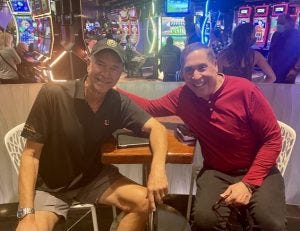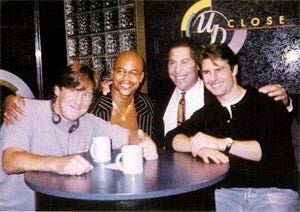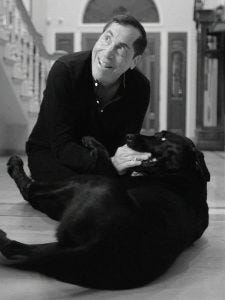Sunday Morning Coffee — October 24, 2021 — Up Close With Roy
Roy Firestone lived every kid’s dream. Grown-ups, too. And he’s not finished.
In the 1980s and 90s you couldn’t turn on ESPN or Sunday Night Football, or a sitcom or animation, without Roy Firestone popping into your living room. Heck, he even showed up in movie theaters. The guy was everywhere.
Then all of a sudden, he wasn’t. Instead, Firestone’s career transcended to writing and performing. He remained in the local television limelight doing programming in his home Los Angeles market, but by and large he left the national television stage for a nightclub setting.
Roy Firestone was, and no doubt still is, one of the great interviewers of our time. He’ll return to the spotlight in a special three-part series, G.O.A.T.S, that will air in the first quarter of 2022 on ESPN and ABC.
“I’m really excited about this new project,” Firestone told me a couple of weeks ago as we visited in Las Vegas. “I’m interviewing the greatest athletes over many generations — Martina, Rodman, Pete Rose, Katie Ledecky, Jerry West, Cal Ripken, Dr. J, Carl Lewis and a bunch of others. They are all G.O.A.T.S., the greatest of all-time.
“It’s a television rebirth of sorts for me,” the seven-time Emmy Award winner proudly smiled.
Firestone’s interviewing technique was born on a Sunday evening call-in sports radio show he and I hosted together as University of Miami students in the fall and winter of 1973-74. He was the sports director of the school’s radio station, WVUM, and I was the sports editor of the campus newspaper, The Hurricane. I was a senior and Firestone, now 67, was a junior. If nobody called during the one hour show we could always hedge our time with interviews of Baltimore Orioles players. Roy grew up on Miami Beach and worked as a batboy for the Orioles in Miami during spring training in 1970 and ‘71. He was extremely well liked by the players and even then had a rolodex of contacts larger than a term paper. He didn’t hesitate to use it if things got slow for us on a Sunday show.
Television loomed for Firestone after his graduation from The U, going to work as a sports reporter/anchor for the ABC affiliate in Miami before moving to KCBS in LA where is was a sports anchor from 1977-85. Concurrent, he was hosting his own show, SportsLook, first on USA Network and then on ESPN, generating headlines as perhaps the best interviewer in the game.
Legendary Los Angeles Times columnist Jim Murray thought so, writing, “Roy Firestone is the best interviewer I ever saw. That’s not a sports interviewer. That’s interviewer, period. That includes Mike Wallace, Barbara Walters, Diane Sawyer, Morley Safer.” High praise? No. It was the highest praise from arguably the best sports writer to ever pen a column.

Roy (l) and Roy (r), forty-seven years after Roy & Roy.
Firestone was in Las Vegas a couple of Sunday nights ago to interview Pete Rose for his upcoming television special. He was leaving the next morning to go to Atlanta to catch-up with Dr. J. He got in touch and we met for dinner at Aria. Many years have gone by and the conversation was never ending including lamenting over the present dismal state of football at our alma mater.
Of course I couldn’t help but remind Roy, that without me as his college interview partner, there might never have been a Roy Firestone.
“Absolutely,” he laughed. “If there was no Roy Berger there was no Roy Firestone. Come to think of it, Roy and Roy. We were even more impactful than Siegfried and Roy!”
Pour yourself another cup of Sunday morning coffee (or three) and enjoy some memories from a still very dynamic personality. Let’s turn the tables a little bit on the interviewer and make him the subject as we go Up Close with Roy Firestone:
From the clubhouse of the Baltimore Orioles to The U to network television affiliates in Miami and LA to the bright national spotlight. How did it happen?
Like most things in life, a combination of hard work and some luck. I caught on very early with ESPN doing a show called Sports Hotline after three years with KCBS in LA. I was at ESPN even before Chris Berman. From there we did SportsLook at USA Network and then it moved over to ESPN in 1980. SportsLook became Up Close in 1984. The show ran until 1994.
How many interviews did you do in those 14 years?
Over 5,000.
Give me some of the best.
For a never a dull moment, never a bad interview it has to be Wilt Chamberlain. He was larger than life, not only in size but personality. He was incredibly entertaining. He looked at himself as the king of the world. Not ego, he was just Wilt. Jim Valvano was an unbelievable guest as was Charles Barkley. They were just wonderful. Barkley was the single most fun guest I ever had. Outrageous, outspoken, just fun.
I’m kidding when I say this, but a lot of people may hate you for the role you played in Bill Walton’s public persona.
Funny. I watched Bill gain his feet verbally over the years. His stutter was so bad as a youngster, he really learned to verbalize with repeat guest spots on my show. I helped him get into a comfortable place and he started pontificating. Some might say he over pontificated. I will say this — he is without question the sweetest individual I’ve ever met in my life.
Like most of us kids growing up in the 50s and 60s, without all the distractions kids of today have, our parents were so instrumental in our lives. Tell me about your dad and the role he played shaping your life and career in sports.
My father would have been better at what I did than I was. He was well read and wrote really well. He was a scribe. He was in the garment business, but it wasn’t what he loved. Sports was. He would sit down every night and watch Up Close and see me with Jack Nicklaus, Warren Spahn, Rachel Robinson and he lived his life through me. His first love were the New York baseball Giants and Willie Mays. One of my early assignments as a reporter in LA was interviewing Mays when he was in town to play the Dodgers. He was in a bad mood that day and just surly. I got nothing from him. As soon as I got home my dad called. He wanted to know how it went. I didn’t have the heart to tell him. ‘Dad- it went great. What a great guy Willie is.’ He never knew the truth.
Two amusing stories about your dad that I love included Ted Williams and Richard Nixon.
Yeah. Williams was doing a fund raiser in Florida, and he wanted me to host it and perform. I asked him if I could bring my dad? Ted sounded just like John Wayne. “Hell yeah, bring him,” he said. Williams was like a god to Dad and I knew he would want to go. Well, the event was about to get started and there was no sign of Williams or pitching great Bob Feller, who was also a guest. I scrambled looking for them. In a side room was my father regaling the both of them with baseball stories from the 1930s and 40s. I told Ted it was time to get started. “Leave him alone,” Ted said. “Your dad really knows his stuff.”
What about Nixon?
My dad couldn’t stand him. He hated Nixon and his policies. I had Nixon on the show in 1992 and all he wanted to talk about was baseball. Nixon knew the game. We talked about the dead ball era and baseball in the 1930s. He loved Ruth and Gehrig. The interview was fascinating and fun, and Nixon was really enjoying himself. During a break he leaned over to me and softly said, “Hey, Roy, you know what show of yours I really liked? The show with your dad. Please send him my best.” After the show I called Dad and told him about my interview with Nixon. My father said, “That man was a criminal and a crook. I hated the SOB.” I told him that Nixon said the show I did with him on Father’s Day was Nixon’s all-time favorite. There was a long pause from my father. Then he said, “Well you know, Nixon did many great things, he was a very accomplished President.” It just cracked me up.
You had Howard Cosell on Up Close and asked him a question he didn’t like.
Howard was great as long as someone else was being put down. But if you ever questioned him or crossed him, that was the end. He was the great narcissist. He wrote a book and in it ripped other on-air personalities including his Monday Night Football mates, Frank Gifford and Don Meredith. So I asked him, “Howard, you believe in friendship. These guys are not only your colleagues but your friends. Why would you rip them?” He said, “I had to tell it like it is.” I told him I didn’t think that really was necessary. He didn’t like being challenged. He told me on the air that it was the end of our friendship, and he would never do my show again. And he never did.
I love the George Steinbrenner story. That took guts.
I emceed a fund raiser for George in Tampa. Everyone knows about his faults but the man was incredibly benevolent. He also knew I was a huge Orioles fan and I despised the Yankees. At the end of the event, portrayed as a token of his appreciation, he gave me a Yankees jacket and told me to put it on. That was like asking me to wear a swastika. I wasn’t going to do it. The audience started chanting “put it on, put it on” but I wasn’t going to do it. I wasn’t sure how George would react, but he started laughing and took back the jacket. Whew!
How did your role as a commentator on Sunday Night Football happen?
ESPN called in 1987 and asked how would I like to be a football analyst? I told them it really wasn’t my thing, but the format was going to be Mike Patrick doing play-by-play, a weekly guest commentator and me. They wanted me to interview the guest commentator between plays. I found it really hard to ask questions or probe to any degree with very little time. It just wasn’t a good fit and after two years it ended.

Up close on the Jerry Maguire set. From left: writer/director Crowe; Gooding Jr.; Firestone and Cruise.
You played a key role in the 1996 movie Jerry Maguire. How did they find you?
That was strange. I interviewed Dennis Rodman on Up Close. Dennis is very emotional and he started crying during the interview. Cameron Crowe was the writer and director of Jerry Maguire and he saw the Rodman interview while developing the movie. He called the show and asked how does he get Roy Firestone for a part they were writing? So they called and asked me how would I like to do a movie with Tom Cruise. I said let me think about it for a second. Okay, yes!
How much notoriety did it give you?
It was incredible, but the funniest thing was after I shot the scene I totally forgot about it. I figured it would never survive the cutting room floor. About a year later, when the film opened, I got a call from a friend and he told me I was in a crucial scene with Cuba Gooding Jr. I couldn’t believe it. I was at the theater the next morning for an 11 am show. I got there before the ticket takers and popcorn poppers.
In the movie, you interview Gooding who played an NFL superstar, and he warned you “I’m not going to cry, Roy” and then you proceeded to make him cry. That ultimately led to an encounter with Sir Paul McCartney.
I was at a reception at the Cavern Club in Liverpool, where the Beatles first started. It was 1999 about three years after Jerry Maguire was released, and I was invited through a friend of a friend. McCartney was going to perform but we were told he would not be at the reception. We were getting ready to leave and Paul is standing right behind me. I look at him, he looks at me. I’m an insane Beatles fan. He points at me and says, “Where do I know you from?” He said he knew me, and I told him I didn’t think so. He said, “yes I do.” He then says, “I know, you are the guy who makes people cry.” He asked me my name. He then said, “Don’t make me cry, Roy.” He introduced me around the room as the guy who makes people cry. It was probably the strangest thing ever to happen to me. The idea that Paul McCartney would be having a conversation with me for even 30 seconds still has me reeling.
How best to sum up what you’ve been doing for the past 20 years or so since you left the daily ESPN stage?
A little of everything. I’m still doing some interviewing. I do local television spots in LA. I’ve written four books including a new children’s book about a boy and his dog that I hope will raise money for animal rescue. I do my corporate variety shows which I love. It’s all on my website. (Royfirestone.com). All things considered I’ve had a pretty amazing run. I don’t think anyone has a better life than me in terms of diversity of what I do. Coming back to ESPN and doing the interview show is like a high school reunion for me. It’s been wonderful.
Certainly, your talents have transcended from the interview platform. Your television credits include Everyone Loves Raymond and Married With Children. Your voice was Bart Starr on The Simpsons. You’ve done multiple appearances on Late Night with David Letterman, Later with Bob Costas, Larry King Live and The Tonight Show. But it all started for you as a kid with your variety act.
I’ve been doing that longer than anything in my life. I’ve performed since junior high school on Miami Beach. My first impression was JFK, that was my introduction to voice artistry. My show is a sports variety show. I do impressions, skits and I sing. I’ve done over 2,000 shows. I actually got my big break when I was doing a private performance at LA’s Bel-Air Country Club for a golf event in 1990. Steve Wynn was in the audience, and he told me after the show, “We’ve got to get you to Vegas.” Next thing I know I’m at Wynn’s Golden Nugget opening for Lou Rawls!
And since, you’ve played in over two thousand venues over two decades performing with the likes of Josh Groban, Reba, Forrest Whitaker and Jon Bon Jovi. Is the show still going?
Yes, but with Covid things went dark. I now enjoy doing one night events at corporate outings, conventions and trade shows. I’m hoping those will heat back up once we get this pandemic behind us.
Tell us about the two Kobes in your life.

Roy with Kobe.
I knew Kobe Bryant very well. After the accident I was devastated and depressed. I needed something but wasn’t sure what it was. About three weeks after he died, I adopted a black lab. Kobe was about 17 pounds overweight, but we walk about nine miles a day and now he’s in great shape. Kobe rescued me when I needed to be rescued.
So, what’s still in the tank for you at almost 68?
Everything. I love what I’m doing. I love performing. I love music. I love interviewing. If I have to keel over doing what I love, well that’s the way to go. I’ve never been happier than I am now.
Roy, I have some free time. Why don’t we bring back our Roy & Roy Sunday night radio show? I’ll even relent and let you have top Roy billing.
I’ll get back to you on that. Don’t sit by the phone waiting.


